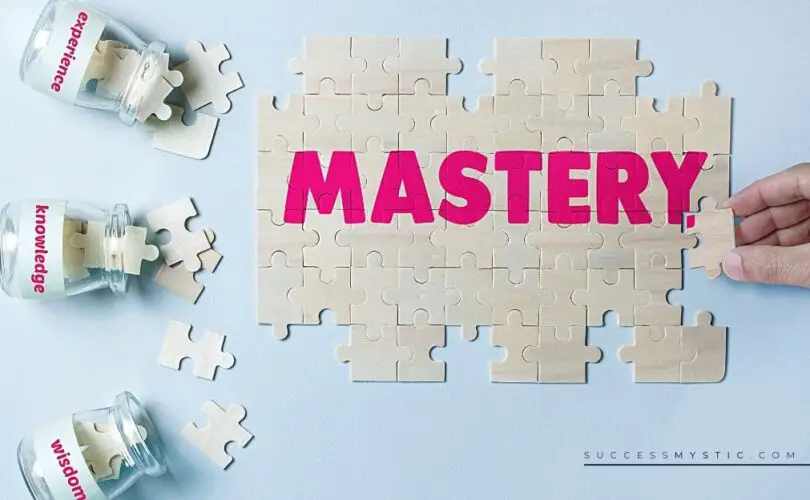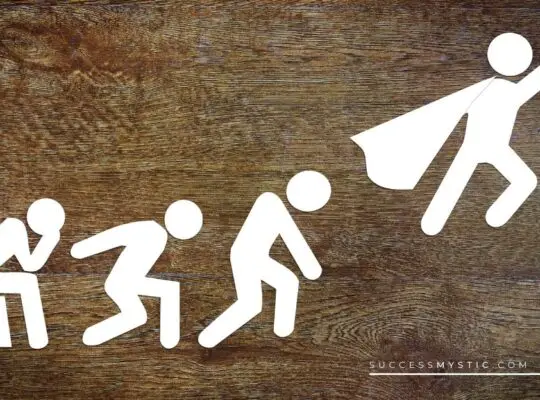A Long Path Of Adventure
How can you achieve self-mastery? A person who has self-mastery has faced and worked through their weaknesses. They also identify and build on their strengths. The first step in achieving self-mastery is to understand what self-mastery is and how it shapes your success.
Consider self-mastery as a long path you are ready to embark on and get ready to learn the steps you need to take. This will be an adventure for you. In achieving self-mastery, you will face your weaknesses and find ways to master them. You will also build your skills, confidence, and inner strength.
According to research in the journal Psychological Review, humans are born with intrinsic, or internal, motivation. Intrinsic motivation is the desire and drive to develop and master ourselves and the world around us. When children learn to walk, talk, and play, they display the intrinsic motivation to understand themselves and connect with the world.
As children become adults, some people lose their intrinsic motivation to continue growing and developing. They become complacent in the safety of who they are and what they can do. Achieving self-mastery is continuing your growth and becoming the best version of yourself.
Too often, people blame their lack of growth and success on others. According to a study by Brown University, researchers determined that blaming others is a moral judgment that involves both cognitive and social aspects.
When someone blames others, they do not have to face their own weaknesses. Instead of using an intrinsic motivation to grow, they shift blame for a failure to external or extrinsic factors. This mindset becomes comfortable and preferred over working through their weaknesses. However, this mindset does not promote self-mastery or success.
Self-mastery is not absolute control and dismissal over one’s weaknesses. Self-mastery is examining and accepting your weaknesses, so you can find ways to overcome them.
Growth Versus Safety
In each stage of human development, psychologist Abraham Maslow theorized the intrinsic motivation that causes people to grow is opposite to their need for safety.
Developmental growth is characterized by:
- Forward Movement
- Whole Self
- Uniqueness
- Achievement
Safety is characterized by:
- Fear of the Unknown
- Past as Present
- Lack of Improvement
Intrinsic motivation makes you want to achieve growth and self-mastery. It provides forward movement in life. As you learn and grow, you explore your whole self, both your positive and negative qualities and work through them.
Your responses to growth versus safety are unique to you, even as your experience is part of being human. Intrinsic motivation helps you achieve self-mastery and find success in life.
Safety is based on a fear of the unknown. Failure, success, and how much effort growth will take may seem daunting or beyond your capabilities. Safety keeps you comfortably in the past. Instead of moving forward, you allow your past successes always to be the end goal of your present.
If you allow your past to overshadow your present, you have no reason to learn and grow. For example, consider the players on a winning high school football team. Years later, players who chose a safety mindset may still consider their winning season or a particular play the highlight of their success.
Those who chose the growth mindset may still use the skills they learned, like teamwork and physical fitness, but have achieved much more in life than their safety-minded teammates.
A lack of improvement also characterizes safety. All human beings have weaknesses and flaws. With a safety mindset, a person chooses not to examine or work through their flaws. A growth mindset includes development and success by accepting and overcoming weaknesses.
Self-Mastery Process
Self-mastery, like any goal, requires taking specific steps to achieve.
The path or process of self-mastery includes:
- Self-Awareness
- Self-Knowledge
- Self-Development
- Self-Mastery
A study by the University of Texas found that a person involved in self-awareness will objectively see both their good and bad qualities. This self-examination becomes self-knowledge, or the ability to understand and accept oneself.
Self-development is action. Self-development involves the steps needed to reach self-mastery, or the ability to use your strengths and weaknesses to achieve success.
The researchers found that many people are willing to engage in some form of self-awareness and self-knowledge but find it harder to move to the action of self-development.
In the growth versus safety model, the safety of knowing who you are outweighs the desire to change. Often, these weaknesses serve a purpose in how you live your life.
For example, here is a short list of safe weaknesses:
- I’m not mechanically inclined.
- I’m not a good public speaker.
- I have a lot/few friends.
Believing that you are not mechanically inclined gives you the safety of not having to fix or assemble anything. You don’t have to face failure if you have difficulty performing such a task, and you save time by letting someone else do the work. The drawback of this weakness is that it limits your understanding of how things work and reduces your self-sufficiency.
Many people fear public speaking. But if you don’t speak out, you won’t get your questions answered, contribute your knowledge, or build support for your ideas. The safety of staying quiet can severely hamper a person’s career success.
Neither having a lot of or a few friends is wrong or bad. However, if you use this as a safety position, it can keep you from building new, supportive friendships or make your friendships too superficial to be supportive.
Using the steps of self-awareness and self-knowledge helps you determine how well your friendships fit into your life and if they are keeping you from self-mastery or not.
Benefits Of Self-Mastery
The process of self-mastery can be time-consuming and challenging work. What then are the benefits of choosing growth over safety? According to a study in Motivation and Emotion, self-mastery provides the ability to focus on a problem and find solutions to overcome it. Rather than getting frustrated and giving up, self-mastery allows a person to succeed in life.
The benefits of self-mastery encompass many aspects of self and life. They include:
- Full Expression of Self
- Reach Full Potential
- Gain Knowledge
- Live in Excellence and Honor
- Reduce Ego
- Compassion
- Stronger Relationships
- Opportunity
With self-mastery, you will know and understand yourself. You will have the strength to express yourself and reach your full potential. As you gain knowledge about yourself, you will use that knowledge to overcome challenges and reach success.
By knowing you are being and doing your best, you reduce selfishness and ego and live in excellence, honoring your true spirit.
By building your self-awareness, you learn to have compassion for yourself and others. Compassion builds stronger relationships that help you support and be supported by other people. When you overcome your fears through self-mastery, your life has more opportunities for happiness and success.
Self-Mastery Methods
There are many steps you can take to develop self-mastery. Which ones you use will depend on your areas of weaknesses. The methods for self-mastery fall into three categories:
- Mental Methods
- Emotional Methods
- Practical Applications
Don’t get discouraged if some of these methods seem difficult at first. A study in Health Psychology Review states that forming habits requires repetition and does get easier over time.
Mental Methods
1| Ask Why
To achieve self-mastery, you need to define your goals. Ask yourself why you want to reach these goals. Are they important to you, and do you feel they are expected of you? What are the benefits of obtaining your goals?
What are the drawbacks to reaching these goals – what might you need to change or stop doing to obtain them? Desire and commitment are keys to self-mastery. Your goals should be personal and fundamentally important to you.
2| Honesty
Self-mastery requires honesty. You will not face and manage your weaknesses if you aren’t honest about what they are and how willing you are to overcome them. Self-awareness and self-knowledge do not automatically lead to self-development. Studies in the 1970s published in the American Journal of Health Promotion found five stages relating to change:
- Precontemplation
- Contemplation
- Preparation
- Action
- Maintenance
Unless you are honest with yourself as you contemplate self-mastery, you will not face your actual weaknesses.
3| Acceptance
Once you have identified your weaknesses, you need to accept them. Self-mastery does not make all your weaknesses disappear. Instead, self-mastery helps you to work through your weaknesses so that you can move past them.
A study in the Journal of Rational-Emotive and Cognitive-Behavior Therapy found that self-esteem and self-acceptance are two different concepts.
Your self-esteem does not have to suffer because you accept your weaknesses. By accepting your weaknesses and working through them, you improve your sense of control and self-esteem.
4| Meditation
Mindfulness allows you to focus on who you are now, not on the past or future. Self-mastery is a daily achievement. Being mindful of the present helps you to overcome problems because it allows you to focus on and consider the best solution, not one from your past or based on your hopes for the future. Meditation promotes mindfulness.
During meditation, you begin to view your thoughts without emotion. You can make clear, rational judgments that help develop self-mastery.
5| Small Steps
As an example, “I want to be skinny” is not a realistic goal. This goal is to0 vague to develop self-mastery of everything you would need to do to be skinny. And skinny is not defined because it isn’t measurable or specific.
A better goal would be losing ten pounds by your birthday. For this goal, you can take small steps with diet and exercise and see your progress along the way. Succeeding at small steps helps create habits that build self-mastery.
6| Leverage Your Strengths
As you face and work through your weaknesses, you can use your strengths to boost your self-confidence and self-esteem. In the weight loss example, perhaps the person likes to spend time in nature or enjoys fresh carrots.
Those strengths can be leveraged to build self-mastery. Time in nature can be spent walking or hiking. Liking carrots might lead a person to try other crunchy vegetables like celery or broccoli. Your strengths are a vital part of self-mastery when you leverage them to create change.
7| Be Prepared
Challenges and problems can happen at any time. If you are unprepared to manage them, it will be hard to achieve self-mastery. In the weight loss example, there will be situations when you are tempted not to follow the steps to your goals.
A coworker will bring cupcakes to share, the vending machine will only have candy and chips, or you will be running late and not have time to make a healthy breakfast. By being prepared for these situations, you can achieve self-mastery. You might have half a cupcake to enjoy socially but limit the calories.
Bringing your own snacks to work keeps you from using the vending machine. Preparing breakfast foods, the night before can save you time in the morning. Self-mastery is a process of knowing and facing your weaknesses and challenges while finding ways to work through them.
Emotional Methods
1| What can you leave?
As you add self-mastery skills, what are you willing to leave behind? Reaching a goal requires hard work. You may need to put aside things for now or leave them behind to achieve self-mastery and your goals. Consider some of the things you may forgo, even for a while, while you focus on your goals:
- Time with Family and Friends
- Activities Not Connected to Your Goals
- Social Media
Although time with family and friends is important, focusing on improving your skills through school or working on a project may mean you will have to plan time around your goal activities.
You may need to limit the time you spend watching television, playing video games or sports, or shopping. Before you can achieve self-mastery, you need to decide what you are willing to leave while focusing on your goals.
2| Do Something You Are Scared of Doing
The fear of moving beyond what feels safe holds people back from achieving their goals. Self-mastery forces you to confront your fears and work through them. A study in Emotion Review states that actions are often based on strong emotions.
When fear keeps you from doing something, it can harm your self-esteem and make you fearful of other things. Often, people find that when they confront their fear, they have better self-mastery in others areas of their life too.
A person can fear something for many different reasons. You can talk yourself out of trying new things that might help you because of your fear. And fear is often unfounded or not based on reality. Parachuting, taking a kick-box class, or cooking a meal for your friends may seem scary, but once you accomplish it, you will have taken a significant step towards self-mastery.
3| Stop Perfectionism
In a Clinical Orthopedics and Related Research study, scientists describe the difference between the pursuit of excellence and perfectionism. They state that working hard or even pushing yourself to the brink are signs of excellence.
They describe perfectionism as being based on anxiety and low self-esteem. When a task or goal is completed, those who pursue excellence are satisfied, while those who engage in perfection are not satisfied.
Perfection is not self-mastery. No one can be perfect at everything. Meeting your goals should not be dependent on being perfect. Otherwise, you are setting yourself up for failure, not self-mastery.
4| Hire Skills
Understanding that perfectionism is not healthy or possible, there may be times it’s best to hire someone to perform tasks that you cannot accomplish. You may also decide it’s better to hire someone rather than spend too much of your time on a single task. Self-mastery means to face and work through your weaknesses, not do everything by yourself.
As an example, perhaps your goal is to landscape your yard. Taking the time to learn what plants are best for your area, testing the soil, and designing the payout are all self-mastery experiences. The knowledge you gain will help you maintain your yard in the future. Planning your own design is a creative outlook that can boost your self-esteem.
But due to age or physical health, you may not be able to dig up all the soil before planting. You may not own a vehicle large enough to transport all the plants and supplies to your home. Rather than spend countless hours trying to do these tasks, you may decide to hire help. There is no shame in admitting your weaknesses when you find solutions to overcome them.
5| Find Mentors
Mentors are people who can help guide you on the path to success. They often have knowledge or insight that you do not possess but are willing to share their experiences with you.
A study in the Journal of Vocational Behavior compared the benefits of having a mentor in youth, academic, and workplace settings.
The researchers found that having a mentor had benefits in these areas:
- Behavior
- Attitude
- Health
- Relationships
- Motivation
- Career Outcomes
When you identify your weakness through self-mastery, finding a mentor to help you work through and overcome them is a critical step. A mentor can be a senior coworker, a teacher, or a trusted friend.
6| Build Relationships
Along with mentors, the support of the people around you can help you develop self-mastery. A study in the journal Psychiatry found that social support reduces vulnerabilities and stress. To overcome distractions, doubts, and temptations, a support system can give you the reinforcement needed to build and maintain self-mastery.
7| Serve Others
Self-mastery should be shared. A study in the European Journal of Personality stated that empathy or a principle of caring causes people to help those:
- Whose Needs Require Planning
- Not Personally Known
- Outside the Established Group
Many people will speak kindly to others they know and who are part of their social or cultural group. Self-mastery recognizes the need for caring in all people, even if you aren’t personally connected to them.
Opportunities to serve others include:
- Charitable Donations
- Volunteering
- Political Support
Donating money, time, or goods is a way to help others you may never meet. Volunteering is often more personal, but you may be helping others not in your social or economic group. Helping to promote political support to change laws or determine funding is a way to serve many people who may need help.
Practical Applications
Achieving self-mastery is not just reaching a goal. Self-mastery is a way of life. You can develop self-mastery and incorporate it into your life by using practical applications to make fundamental changes.
1| Budget
Do you know where your money goes? Budgeting is a practical application that requires you to face and work through any weaknesses you have about finances. Some people show love by buying themselves and others things that they can’t afford. Some people are frugal to the point of stinginess. Others don’t budget and wonder why they are out of money before every payday.
You can hire a financial planner to help you budget for both small and large expenses. Or you can follow basic budgeting guides. Most banks and credit score companies have budgeting tools available.
A general budget outline includes:
- Know your net income.
- Track your spending.
- Set savings goals.
- Decide what is a need and what is a want.
- Adjust your spending and/or increase your income.
- Monitor your progress.
What you make per hour is not what you have to spend. Your net income is your total pay minus taxes and other paycheck deductions, like health or life insurance. Next, keep track of what you spend and when bills are due. Don’t let the ease of paying with a debit or credit card trick you into not accounting for your spending. The cost of take-out meals or a daily coffee can add up quickly.
Having cash reserves is essential if you want to make a large purchase like a car or house. A savings account also helps you manage if you lose your job or get laid off. You should set savings goals based on what you want to achieve.
Through self-mastery, you will have a better idea of what you are willing to change or spend less on to reach your goals. You will also understand your weakness. If the vending machine is a temptation, for example, stop carrying loose change.
To reach your goals, you may need to adjust your spending, spend less, or increase your income. Do you have a hobby or talent that you can do to earn more money? How much of your free time are you willing to forgo to take a part-time job or go back to school to earn a raise? Self-mastery helps you make these decisions.
Finally, monitor your progress. With any goal, you need to take small steps and celebrate your victories along the way. You might want to save up for a smaller purchase and use that success to save for something more.
2| Live a Healthy Lifestyle
To reach your goals, you need self-mastery over your physical health. Staying healthy through exercise, diet, getting enough sleep, and getting regular medical checkups is part of self-mastery. Improving your health helps you have the focus and energy to reach your goals. Medical experts suggest these healthy guidelines:
Exercise-The Centers for Disease Control (CDC) recommend 150 minutes a week of moderate aerobic activity or 75 minutes of vigorous aerobic activity. They also recommend strength training to build your muscles.
Diet- The CDC also recommends a healthy diet that includes:
- Fruits
- Vegetables
- Whole Grains
- Fat-Free or Low-Fat Dairy
- Protein like Lean Meat and Fish
- Low in Saturated Fats, Trans Fat, Salt, and Added Sugars
Sleep– The National Sleep Foundation recommends adults get between seven and nine hours of sleep per night.
Medical Checkups– Doctors at Mount Sinai Medical Center recommend adult medical checkups based on age:
- Age 30 years and younger, every two to three years, along with routine health screenings
- Age 30 to 40 years, every year
- Women over age 40, yearly breast cancer screening
- Age 50 and older, yearly with routine health screenings
3| Develop a Talent
Self-mastery involves organizing and using your life to reach your goals. Developing a talent that takes daily practice helps you build the skills of commitment, routine, and perseverance.
Learning to focus on your practice time also enables you to work through your weaknesses and temptations not to reach other goals. And as your talent grows, you will increase your self-esteem.
4| Empowering Rituals
According to a study in Scientific American, rituals are symbolic behaviors we perform before, during, or after a meaningful event.
Researchers have found that rituals benefit people by:
- Improving Performance
- Lessening Anxiety
- Increasing Confidence
- Reducing Grief
Rituals can be performed in a group, like a team chant before a sports game, or privately, perhaps at the start of the day or before a challenging event.
Self-Mastery Habits
Unlike a ritual, which is symbolic, a habit is a direct practice to improve performance or situations. Over time, self-mastery habits change your mindset. Phycologists define two different mindsets, fixed and growth.
Researchers at Stanford University describe a fixed mindset as the view that your traits and character are fixed and cannot change. A growth mindset, often used by business leaders, is described by the Harvard Business Review as the belief that your traits and character can be developed and changed with hard work, planning, and support from other people.
According to a study in Brain Sciences, a growth mindset builds intrinsic motivation. When you understand that you can face and work through your weaknesses and use your strengths to reach your goals, you increase your internal motivation. Self-mastery habits create a growth mindset and build intrinsic motivation.
Affirmations
Affirmations are positive statements said out loud that help boost your self-esteem and performance. A Social, Cognitive, and Affective Neuroscience study found that affirmations increase self-esteem by activating specific neural pathways in the brain.
With a growth mindset, affirmations help provide intrinsic motivation to reach your goals. The self-mastery achieved through affirmations improves your self-confidence.
Affirmations include positive self-talk and a strong belief in your future success. Your affirmations should help you reach your goals and counter-act your weaknesses, especially self-doubt.
Examples of affirmations include:
- I will succeed.
- I am closer to my goal today than I was yesterday.
- I am worthy of love.
- I deserve respect.
- I can overcome my past.
- My life is good, and I can make it even better.
Steve Jobs, the co-founder of Apple, has his own variation of affirmations. He asks himself, “If today was the last day of my life, would I be happy with what I’m about to do today?” Asking yourself this question can help you resist temptations and use your time to reach your goals.
Vision Board
A vision board is a representation of your goals. When you create a vision board, you create an object that focuses your attention, thoughts, and emotions on success. Using a vision board helps you achieve self-mastery by reminding you of your goals and helping you see yourself reaching them.
A vision board can be done on the computer or by hand on a posterboard. Using pictures and words that reflect your goals, you create a collage of how you want your life to be. Place your vision board where you can see it every morning to start your day committed to your goals.
Gratitude Journal
A study in the journal Psychiatry states that gratitude is an appreciation of value and meaningfulness to a person, resulting in a general state of thankfulness and appreciation. In this study, researchers found that gratitude plays a key role in overall happiness and wellbeing. In self-mastery, you can use a gratitude journal to track your progress and success in working through your weaknesses while reinforcing a growth mindset.
Gratitude for a situation is the opposite of complaining. For example, if one of your weaknesses is difficulty taking constructive criticism and one of your coworkers offers you performance advice, you have two choices.
You can allow your weakness to dismiss what they say as jealousy or imagine they dislike you. Or you can acknowledge those weaknesses, carefully consider what they’ve said, and decide how you can act to change it. When you make a change and are rewarded, writing about the experience in your gratitude journal reinforces the self-mastery of working through your weakness.
Smile More
Do you smile at people? During a hectic day or stressful situation, it is easy to bypass this simple gesture.
But a study in The Journal of Social Psychology found that a person who is smiling is perceived as:
- Likable
- Intelligent
- Positive
Self-mastery includes strengthening relationships and building a support system. You will attract more people to your circle of support when you smile.
Final Thoughts
Self-mastery is a path and process. Self-mastery helps you move from safety to growth. The methods of self-mastery include working on your thought and emotions while facing your weaknesses. Practical methods of self-mastery help you create a growth mindset and build intrinsic motivation.
Building the habits of self-mastery takes commitment and practice. According to a study by the University College London, it takes an average of 66 days to make practice into a habit. Giving in to temptation, backsliding, or missing a day doesn’t affect the habit-forming process. Working toward self-mastery builds self-mastery.







